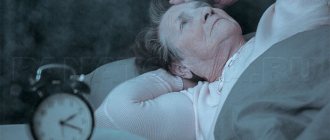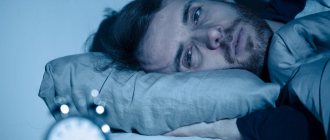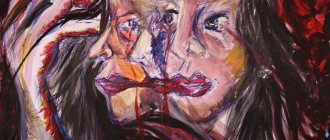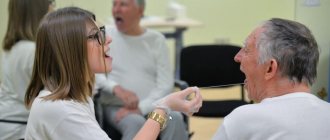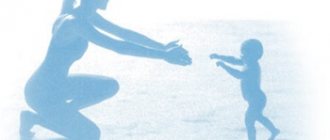Symptoms of insomnia
- Daily difficulty falling asleep;
- Poor sleep;
- Frequent awakenings;
- Early awakenings;
- Frequent disturbing dreams;
- Feeling anxious or restless when waking up;
- Difficulty falling back asleep;
- Lack of feeling of rest after sleep;
- Reduced sleep duration;
- Increased sensitivity and pain to any, even minor, irritants.
Elderly patients with insomnia experience anxiety, awaken mainly in the first hours of sleep and cannot adequately assess its duration.
The benefits and importance of healthy sleep in old age
Sleep is of great importance to the health of all people. It is especially important in old age, and here's why:
• Lack of sleep increases the risk of heart attack and stroke; • During the night's rest, the body recovers; • Sleep strengthens the immune system - insomnia weakens the condition of an elderly person; • Sleep maintains healthy body weight; • During sleep, blood pressure normalizes, this is especially important for hypertensive patients; • Sleep calms and relieves stress.
Insomnia can cause significant harm to both the physical and mental health of a person and aggravate his sick condition. Healthy sleep, on the contrary, promotes health and strengthening, so in case of disturbances it is important to restore it.
Causes of insomnia
Researchers have found that a person who sleeps less than 7 hours a day has a risk of developing diabetes, and is also at risk of heart attack and stroke. In this regard, it is important to establish the causes of insomnia, which may include:
Bad habits
- Violation of sleep schedule;
- Drinking alcohol at night;
- Loud environment or bright light in the room;
Diseases
- Alzheimer's disease;
- Night heartburn;
- Frequent urge to urinate;
- Diabetes;
- Arthritis;
- Arthrosis;
- Osteoporosis;
- Asthma;
- Night heartburn;
- Diseases of the cardiovascular system;
- Sleep apnea;
- Nervous system lesions;
Mental disorders
- Depression (endogenous, neurotic or vascular origin);
Menopause and postmenopause
Insomnia is accompanied by hot flashes and increased sweating not only during the day, but also at night, which prevents restful sleep;
Medicines used in therapy:
- Psychotropic drugs (antidepressant tablets, psychostimulants, nootropics);
- Antihypertensive drugs (clonidine, b-blockers);
- Drugs against cardiac arrhythmia;
- Bronchodilators (ipratropium bromide, terbutaline, salbutamol, theophylline drugs);
- Hormonal drugs (glucocorticoids, thyroid hormones, progesterone);
- Some types of antibiotics (quinolones);
- Lipid-lowering drugs (statins, fibrates, cholestyramine);
- Drugs for the treatment of Parkenson's disease (levodopa, selegiline);
- Overdose of cardiac glycosides;
- Medicines for tumors;
- Cough preparations;
- Eye drops containing b-blockers;
- Nasal drops containing sympathomimetics;
- Diuretics;
- Medicines to reduce the manifestations of diabetes mellitus;
Low physical activity
Lack of physical activity can be accompanied by disturbances in sleep-wake cycles. You may also experience difficulty falling asleep or an excessive need to sleep. Regular aerobic exercise will help get rid of these problems.
Unfavorable life situation
Tragic events (such as the death of a loved one) can lead to chronic stress, anxiety, worry and depression.
Loneliness
With age, most people take an inactive social position, which is associated with the cessation of social activities and retirement. The level of communication and the quality of brain function decrease, which prevents the timely onset of sleep. In this situation, experts recommend finding a hobby.
Insufficient sunlight during the day
Sunlight promotes the production of melatonin, which helps regulate the sleep-wake cycle in the body. Elderly people need to receive sunlight at least 2 hours a day. To do this, do not tightly close the windows with curtains during the daytime.
Types of senile insomnia
You need to know that insomnia is not a normal condition. Sleep disorders can manifest themselves in various forms and have certain symptoms. Experts identify the following types of insomnia:
Insomnia
With this type of sleep disorder, a person cannot fall asleep. Even if sleep occurs, its duration is extremely short. In most cases, patients with this type of insomnia are in a stressful state. The problem can be eliminated by stabilizing a person’s emotional background. A psychotherapist treats insomnia.
Hypersomnia
This type of disorder is characterized by an increased need for sleep (from 12 to 20 hours). However, even with such a long rest, older people may not feel invigorated. Most often, hypersomnia affects people who regularly do not get enough sleep and are constantly under stress. This pathology occurs:
- Idiopathic;
- Post-traumatic;
- Narcoleptic.
Parasomnia
It is characterized by a sleep phase disorder in which an elderly person may wake up and fall asleep repeatedly during the night. Often the causes of parasomnia are diseases such as enuresis, sleepwalking, nocturnal attacks of epilepsy or bronchial asthma, as well as a state of fear.
In addition, insomnia can be both short-term and chronic.
Typical sleep disorders
Insomnia can be associated with various disorders. The following are common in older people:
• Insomnia due to medication. For example, some drugs cause nightmares. Diuretics taken at night may cause interrupted sleep. Expectorants can prolong the time it takes to fall asleep. If you have such a problem, you need to tell your doctor about your sleep disorder. Perhaps he will change the treatment regimen or suggest a different drug. • Periodic limb movement syndrome. Sleep disturbances in the elderly may be accompanied by various leg movements during sleep. For example, a person periodically bends his big toe and the leg itself at the knee. • Restless legs syndrome. This sensation is similar to the feeling of running on a surface. Improving lifestyle and increasing physical activity help get rid of the syndrome. • Insomnia syndrome due to depression. The problem is accompanied by a feeling of emptiness, anxiety and early rises, after which the person cannot fall asleep.
Who should I turn to for help?
The Ultramed Gerontology Clinic treats elderly people with various diseases. A psychotherapist treats insomnia in a medical setting. However, depending on the causes of the disease, intervention by other experts is possible.
In many cases, patients undergo an initial examination, which is carried out by a general practitioner, who then refers the client to the right specialist. The help of a psychologist is often effective.
If you need surgical treatment for insomnia, then we are ready to provide you with all the necessary help from highly qualified specialists with more than 20 years of experience.
Diagnosis of insomnia
In order to correctly diagnose the cause of insomnia, it is necessary to conduct a comprehensive examination. The doctor at the Doctor SAN clinic in St. Petersburg will examine the patient and interview him in order to make the correct diagnosis. The patient will greatly help the doctor by frankly describing the nature of the problem and the moment of insomnia.
In order to make an accurate diagnosis, we use the following diagnostic methods:
- MRI. Magnetic resonance imaging
- Ultrasound examination (ultrasound)
- Electrocardiogram (ECG)
- Laboratory research.
Methods for treating insomnia in older people
Medications
Medicines for insomnia can be prescribed only after an accurate determination of the causes of the pathology.
Second and third generation hypnotists
According to the duration of action, they are divided into 3 groups:
- Medicines that have a short period of action (lasting up to 6 hours). This group of remedies helps eliminate anxiety and simplifies the process of falling asleep.
- Medications with an average period of action (up to 12 hours). Taking such medications helps you fall into deep sleep and solve the problem of frequent awakenings at night.
- Long-acting medications (more than 12 hours).
These drugs are the best way to improve sleep in older people, but they have side effects such as drowsiness that does not go away even after waking up.
It is important to remember that second and third generation hypnotics should not be taken for a long period of time.
Antidepressants
Prescribed in cases where the cause of sleep disturbances is a depressive state.
Neuroleptics
Effective in identifying dementia or mental disorders that accompany insomnia.
Sleeping pills
Hypnotics can be additionally used in addition to the main therapy. You should take exclusively sleeping pills only if basic therapy has not given a positive result.
Sleeping pills should be taken with caution, as this group of medications has many side effects:
- Habituation;
- Short term exposure;
- Deterioration in general health;
- Relaxing effect on muscles, leading to falls and injuries.
We recommend resorting to the use of medications in extreme cases, only after using alternative methods of therapy.
Prescription drugs
- Andante;
- Zolpiderm (Sanval);
- Zopiclone (Imovan).
Drugs available without a doctor's prescription
- Corvalol;
- Valocordin;
- Tanakan;
- Donormil;
- Melatonin.
It must be remembered that medications sold in pharmacies without a prescription have their own contraindications and adverse reactions. For this reason, you must carefully read the instructions.
Herbal medicines
The basis of the drugs in this group consists entirely of natural plant extracts. The effect of these medications is to have a positive effect on sleep, improve the psycho-emotional state, reduce anxiety and lead to the fact that insomnia recedes. Herbal preparations include:
- Motherwort Forte;
- Persen;
- Novo-passit;
- Dormiplant.
Unlike synthetic drugs, herbal products do not have a large list of side effects, but have some contraindications. Therefore, it is always necessary to consult a doctor.
Homeopathic remedies
Homeopathic remedies have no side effects, are not addictive and can be used for a long period of time. A homeopathic doctor will help you choose a homeopathic medicine. So, the following can be assigned:
- Passidorm;
- Nervochel;
- Notta.
Causes of sleep disorders in the elderly
At night, many older people experience a feeling of anxiety and restlessness, succumb to internal experiences, analyze their day, feel sorry for themselves, and remember their untimely departed friends and relatives. All this affects the quality of rest - old people fall asleep for a long time, often wake up and sometimes even walk at night, staying in the “kingdom of Morpheus”.
Insomnia can be caused by:
- incorrect daily routine - often retirement leads to the fact that a person stops following his usual schedule, goes to bed late and is in no hurry to get up in the morning;
- lack of physical activity - old people simply do not expend accumulated energy and do not have time to get tired;
- diseases accompanied by pain - chronic pain, neurological diseases, pathologies of the cardiovascular system prevent a pensioner from sleeping if they are not treated;
- depression – problems that accumulate like a lump, leading to chronic lack of sleep;
- long-term use of sleeping pills – long-term therapy with sedative medications does not make them effective, reduces their effectiveness and triggers the opposite effect;
- conditions that require improvement - unsuitable humidity, temperature, lighting, uncomfortable mattress, too warm or cold blanket, high pillow negatively affects the comfort of the sleeping person;
- life's troubles, stress, unpleasant events do not allow you to relax and fall asleep quickly;
- high blood pressure, snoring, tachycardia, poor cerebral circulation and other somatic diseases in people over 60 years of age negatively affect the quality of rest of an elderly patient;
- senile dementia, Parkinson's disease, Alzheimer's disease, etc.
It is difficult to fall asleep after a heavy dinner; insomnia often accompanies those who do not go to bed on an empty stomach. Contrary to the popular belief that alcohol accompanies relaxation, drinking alcohol excites the nervous system and interferes with proper rest in old age.
Exercises
Certain exercises, by improving the functioning of the nervous system, will help cope with insomnia in older people without the use of medications.
Breathing exercises
- Lie on your back;
- Exhale deeply through your mouth;
- Then - inhale through the nose to the count of 1, 2, 3, 4, 5, 6, 7;
- Hold your breath;
- Exhale through your mouth, clenching your teeth. Press your tongue against your teeth as much as possible.
You need to perform this exercise 2 times a day for a month, adding one repetition every day. Experts believe that slow counting significantly increases the effectiveness of the technique.
This gymnastics is suitable for patients suffering from stress, increased anxiety and panic attacks.
Morning muscle exercises
It is worth doing it daily. Even light physical exercise will give the necessary stress to the muscles, which will make it easier to fall asleep and sleep soundly. Muscle exercises are effective only in the morning. Doing it in the evening may have the opposite effect.
Prevention of insomnia
To prevent insomnia in older people, experts advise following the following recommendations:
- Take daily walks in the fresh air;
- Go to bed at the same time;
- If possible, avoid daytime naps;
- Maintain the air temperature in the bedroom no higher than 21 degrees, ventilate the room daily;
- It is advisable to only sleep in bed, and not drink tea or watch TV;
- Choose calming “rituals” for yourself and perform them before bed (take a bath, listen to music, breathe deeply). The relaxation technique is individual for each person;
- Do not overeat before bed, avoid heavy foods. Do not drink strong tea and coffee in the evening;
- Use comfortable pillows and mattresses;
- Stop smoking and drinking alcohol.
The main task in the fight against insomnia is to identify and eliminate its cause. The specialists of the Ultramed clinic have been successfully coping with this task for 20 years, using modern effective techniques and an individual approach to each patient. We provide our clients with the choice of a single or shared ward, as well as the ability to transport the patient to the clinic and back absolutely free!
In many cases, the use of folk remedies helps to significantly improve the quality of sleep. Do-it-yourself preparations can be used both internally and externally. Using a holistic approach can help achieve effective relief from insomnia. But it is always important to take precautions to save yourself from harmful consequences.
Oral preparations
- Herbal decoctions;
- Herbal infusions.
Herbal remedies should be taken in courses of 2-4 weeks until symptoms disappear completely.
Having chosen folk remedies as a treatment for insomnia, it is necessary to carefully monitor the general condition of the body. Allergic reactions to decoctions and infusions may occur. This is often due to individual intolerance to their components. In this case, you should immediately stop taking the drug and seek medical advice.
Products for external use
- Relaxing baths based on plants and herbs.
You should stay in such baths for about 10–20 minutes. The temperature should be between 35-37 ℃, otherwise the result will not be achieved. Sessions must be performed every other day, 30 minutes before bedtime.
However, before carrying out water procedures, you should consult a specialist. This condition must be met, since elderly people often have a large number of contraindications for such sessions. It is highly not recommended to self-medicate for those who suffer from hypertension, heart problems, hernias, diseases of the musculoskeletal system and internal organs.
It should be remembered that the use of some methods of treatment with folk remedies can cause changes in blood pressure, as well as lead to stress on the heart and other internal organs. If you have any somatic diseases, it is also important to discuss the choice of one or another non-traditional approach to the treatment of insomnia with your doctor.
Preventive actions
The main effective method is to follow the principles of sleep hygiene, which were mentioned above:
- Maintain a sleep schedule. It is necessary to develop the habit of falling asleep and waking up at the same time both on weekdays and on weekends.
- Don't go to bed until you feel sleepy.
- Try not to think about problems while falling asleep. It is better to deal with the accumulated tasks before going to bed or put them off until tomorrow.
- Avoid sleeping during the daytime.
- Stay physically active. Walking and Nordic walking lasting 30-60 minutes are perfect. However, you should stop exercising at least 1.5 hours before bedtime.
- Follow your diet. Don't go to bed hungry or with a full stomach. Avoid eating later than 2-3 hours before bedtime.
- Give up bad habits, reduce the consumption of caffeine and caffeine-containing products no later than 6-8 hours before bedtime.
